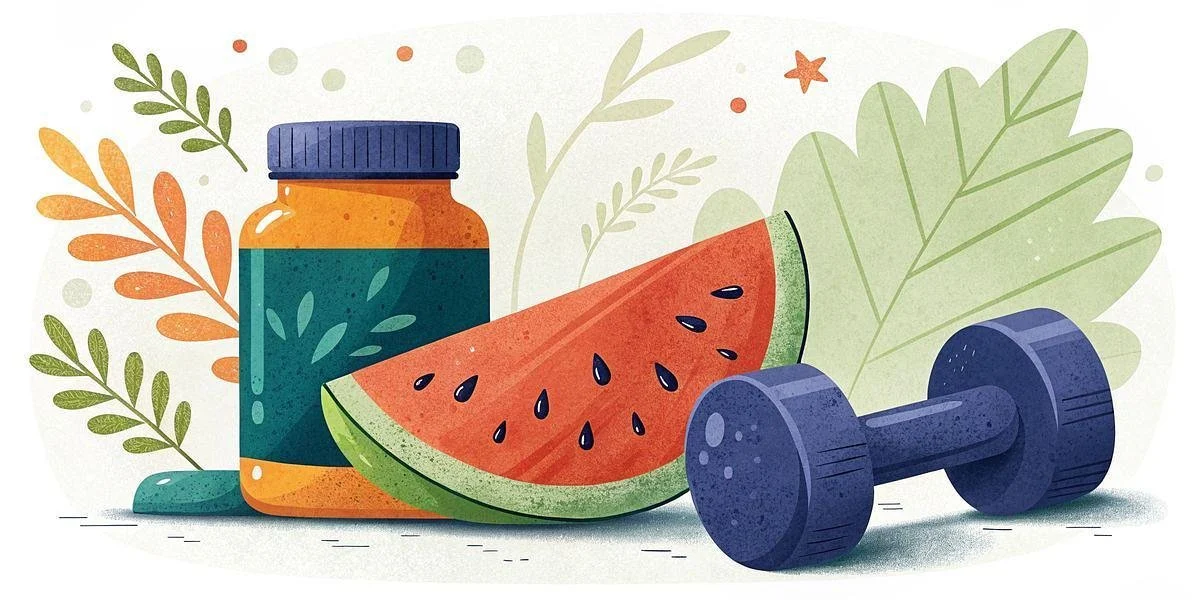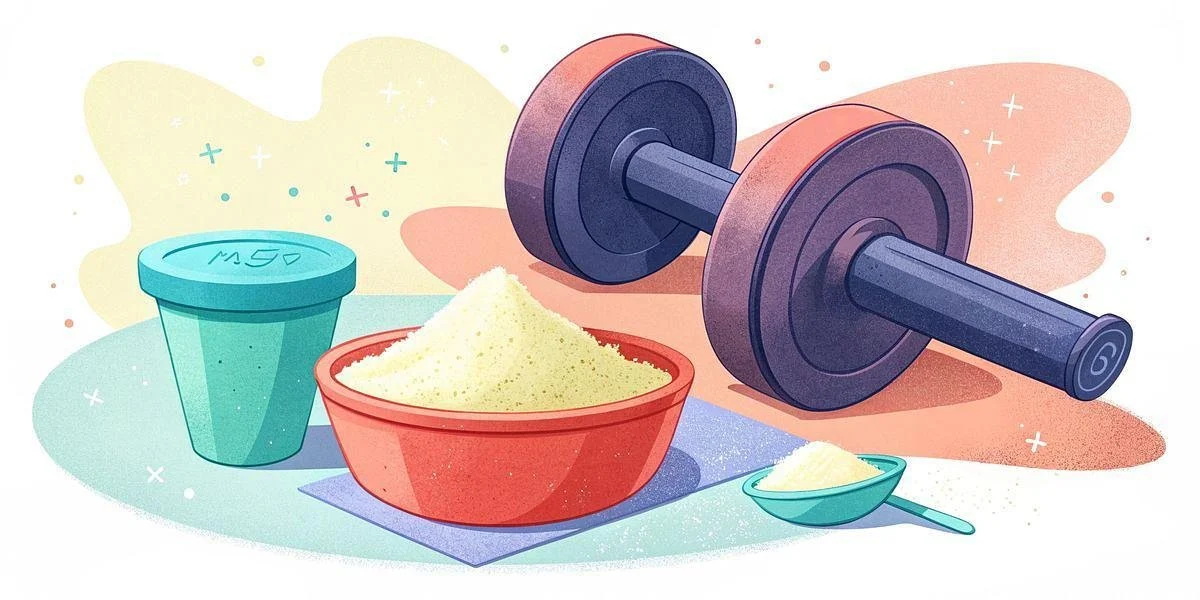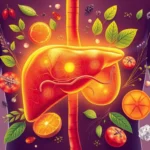Categories:
Are you finding it hard to lose weight, even when you try your best? You’re not alone. Over two-thirds of adults in the U.S. are overweight or obese. Many turn to dietary supplements for help. But do these supplements really help with weight loss? What Supplements are Good for Weight Loss?
In this guide, we’ll dive into the world of weight loss supplements. We’ll help you understand which ones are effective, how they work, and what safety tips to follow.

The weight loss supplement market is huge, with Americans spending about $2.1 billion a year on them. But, only about one-third of users talk to a doctor before using them. This lack of advice, along with the FDA not reviewing supplements before they hit the market, raises big questions about their safety and effectiveness.
We’ll give you the facts, cutting through the marketing noise. This way, you can make smart choices for your weight loss journey. Remember, supplements work best when you also eat well and exercise regularly.
For more info on dietary supplements and their rules, check out the U.S. Food and Drug Administration’s official website.
Unlock the secret to fast and safe weight loss with our top 10 supplement picks!
Key Takeaways
- Weight loss supplements are popular, with 15% of U.S. adults having used them.
- The FDA doesn’t require premarket review or approval for dietary supplements.
- Supplement effectiveness varies, with some showing modest benefits in clinical trials.
- Safety concerns exist for certain ingredients, specially at high doses.
- Consulting a healthcare professional is key before starting any supplement regimen.
- Supplements work best when combined with a healthy diet and regular exercise.
Understanding Dietary Supplements for Weight Management
Dietary supplements for weight loss come in many forms. They claim to help in different ways. These products aim to reduce fat absorption, curb appetite, and boost metabolism. Let’s explore how these supplements work and what you should know before trying them.
How Weight Loss Supplements Work
Weight-loss supplements contain ingredients that claim to promote weight loss. Some have caffeine, which may increase metabolism and help burn fat. Others, like fiber supplements, aim to make you feel full and eat less. But, most supplements lack strong scientific evidence to support their effectiveness.
| Supplement Type | Claimed Mechanism | Effectiveness |
|---|---|---|
| Caffeine-based | Boost metabolism | Mild effect |
| Fiber supplements | Increase satiety | Moderate effect |
| Fat blockers | Reduce fat absorption | Limited effect |
FDA Regulations and Safety Standards
The FDA doesn’t approve dietary supplements for weight loss before they hit the market. But, these products must be free from harmful substances and accurately labeled. It’s important to be cautious, as some weight-loss supplements have been found to contain undisclosed ingredients, including prescription medications.
Different Forms of Weight Loss Supplements
Weight loss supplements come in various forms to suit different preferences:
- Capsules and tablets
- Powders
- Liquids
- Bars
When it comes to weight loss, a balanced approach is key. This includes proper nutrition and exercise. Supplements alone are rarely effective for long-term, sustainable weight loss. Always consult with a healthcare professional before starting any new supplement regimen.
Feel Energized & Shed Pounds: Top 10 Weight Loss Supplements!
What Supplements are Good for Weight Loss
Choosing the right supplements is key for weight management. Many claim to help with weight loss, but not all are the same. Let’s look at some effective supplements for your weight loss journey.
Natural vs. Synthetic Options
Natural supplements come from plants, while synthetic ones are made in labs. Both can affect body weight, but natural ones might offer more health benefits. For instance, berberine, a natural compound, has been shown to reduce body mass index and waist size in obese people.
Popular Supplement Categories
There are several types of supplements that help with weight management:
- Fiber supplements: Boost satiety and aid digestion
- Probiotics: May help reduce body weight and body fat
- Green tea extract: Can increase metabolism and fat burning
- Protein powders: Support muscle growth and fat loss

Evidence-Based Effectiveness Ratings
The Office of Dietary Supplements offers insights on supplement effectiveness. Here’s a quick overview of some popular ones:
| Supplement | Effectiveness Rating | Effect on Weight Loss |
|---|---|---|
| Fiber | High | Significant reduction in body weight and BMI |
| Green Tea Extract | Moderate | Average weight reduction of 2 pounds in obese individuals |
| Probiotics | Moderate | Small but significant reduction in body weight |
| Vitamin D | Low | No meaningful support for weight loss |
Remember, supplements work best with a healthy diet and regular exercise. Always talk to a healthcare professional before starting any new supplements.
Crush Your Weight Loss Goals with Our Top 10 Picks!
Most Effective Minerals and Vitamins for Weight Loss
Some minerals and vitamins are key for managing weight. They can change how your body burns energy and stores fat. Let’s look at the top nutrients that help with weight loss.
Chromium’s Role in Metabolism
Chromium supplements boost your metabolism. This mineral helps insulin work better, turning food into energy. Studies show chromium might help you lose weight by better processing nutrients.

Calcium and Fat Storage
Calcium does more than strengthen bones; it might also control fat storage. A 2024 review found calcium supplements can slightly lower BMI and body fat. But, be careful with calcium supplements as they might increase heart disease risk.
B-Complex Vitamins for Energy
B vitamins are vital for energy. They help break down fats, proteins, and carbs. Higher B1, B2, B6, and B9 levels are linked to less obesity and belly fat. These vitamins fight fatigue, helping with weight loss.
| Vitamin/Mineral | Benefit for Weight Loss | Recommended Daily Intake |
|---|---|---|
| Chromium | Enhances insulin function | 20-35 mcg |
| Calcium | May reduce BMI and body fat | 1000-1200 mg |
| B-Complex | Supports energy production | Varies by specific B vitamin |
While these supplements help with weight loss, don’t forget a balanced diet and exercise are key. Always talk to a healthcare professional before starting any new supplements, aiming for weight loss.
Your Ticket to a Slimmer, Healthier You – Top 10 Supplements!
Herbal Supplements That Support Weight Loss
Trying to lose weight? Herbal supplements are becoming popular as natural aids. They offer benefits for those looking to shed pounds. Let’s look at some popular options for weight loss.

Green tea extract is a top choice for weight loss. It’s full of catechins, which can boost metabolism and fat burning. A capsule has 400-450 milligrams of catechins, and a cup has 240-320 milligrams plus 45 milligrams of caffeine.
Garcinia cambogia is also getting attention. Some studies show it can help with weight loss, with users losing about four pounds in four months. But, results can differ, and it’s key to use supplements with a healthy diet and exercise for lasting weight loss.
| Herbal Supplement | Potential Benefits | Typical Dosage |
|---|---|---|
| Green Tea Extract | Boosts metabolism, fat burning | 400-450mg catechins per capsule |
| Garcinia Cambogia | May aid in modest weight loss | Varies by product |
| Cayenne Pepper | Increases metabolism, reduces appetite | 2-4mg daily |
| Turmeric | May reduce waist circumference | 1,000mg+ daily for 8 weeks |
While these supplements can help with weight management, be careful. The FDA has warned about harmful ingredients in some products. Always talk to a healthcare professional before starting any new supplement, even if you’re on medication or have health issues.
“Weight-loss products can contain dozens of ingredients, and some contain more than 90. Common ingredients include botanicals, dietary fiber, caffeine, and minerals.”
Remember, supplements are meant to help, not replace, a healthy diet and exercise. They can aid your weight loss journey, but lasting weight loss needs a full lifestyle change.
Top 10 Supplements for Rapid Weight Loss!
Natural Appetite Suppressants and Metabolism Boosters
If you’re trying to lose weight, natural appetite suppressants and metabolism boosters can help. These supplements are gentle and help manage hunger. They also boost your body’s calorie-burning power.
Green Tea Extract Benefits
Green tea extract is known for aiding in weight loss. It’s packed with catechins and caffeine. These can increase fat burning and boost metabolism.
Studies show drinking green tea with 100-460 mg of EGCG daily for 12 weeks can help. It can lead to less body weight and fat.

Caffeine and Thermogenesis
Caffeine is great for weight loss because it’s thermogenic. It helps burn more calories and break down fat. Drinking caffeine 0.5-4 hours before meals can also affect hunger hormones.
Fiber Supplements for Satiety
Fiber supplements are key for weight management. They make you feel full, helping you eat less. Women should aim for 25 grams of fiber daily, and men for 38 grams.
Here’s a look at some popular fiber supplements and their benefits:
| Fiber Supplement | Recommended Dosage | Potential Benefits |
|---|---|---|
| Glucomannan | Up to 15.1g/day | Modest but significant weight reduction |
| Psyllium | 5-10g/day | May aid weight loss in overweight individuals |
| Inulin | 10-30g/day | Increased satiety, improved blood sugar |
Adding these natural supplements to your diet can boost your weight loss efforts. They work best with a balanced diet and regular exercise.
Achieve Your Ideal Weight with Top-Rated Supplements!
Safety Considerations and Possible Side Effects
Using dietary supplements for weight loss can be helpful, but it’s important to know the risks. Supplements can aid in weight loss, but they can also have side effects. About 50% of American adults use dietary supplements, with 25% experiencing side effects that needed medical attention.
Common Adverse Reactions
Short-term weight loss supplements can cause nausea, vomiting, headaches, and constipation. Taking high doses or mixing different supplements can raise these risks. In 2019, dietary supplements caused 70,000 calls to US poison control centers, with 7,000 needing medical treatment.
Drug Interactions
Weight loss supplements can interact with medications. For example, vitamin K can make blood thinners less effective. Always talk to your doctor before starting supplements, if you’re on prescription drugs.
Risk Factors to Consider
Long-term use of weight loss supplements can cause serious health problems. These include liver damage, weaker bones, and nervous system issues. Vitamin D supplements and antioxidants may also reduce the effectiveness of some cancer treatments.

Remember, natural doesn’t always mean safe. The FDA doesn’t need to approve dietary supplements before they’re sold. This lack of regulation can lead to unsafe products or misleading labels. Always choose reputable brands and talk to healthcare professionals before starting any supplement regimen.
| Supplement Type | Potential Risks | Precautions |
|---|---|---|
| Herbal Weight Loss Supplements | Liver damage, heart problems | Consult doctor, avoid with certain medications |
| Vitamin D Supplements | Interference with cancer treatments | Inform oncologist if undergoing treatment |
| High-Dose Antioxidants | Reduced chemotherapy effectiveness | Avoid during cancer treatment unless advised |
Boost Metabolism & Shed Pounds with Top Supplements!
Dosage Guidelines and Timing
When you take dietary supplements, it’s important to follow the right dosage and timing. Many weight-loss supplements have specific instructions. These help them work best and keep you safe. Here are some key points to remember when using supplements for weight management.

The Institute of Medicine set limits for 24 nutrients for adults. For example, the Recommended Dietary Allowance (RDA) for calcium changes with age and gender. Adults 19-50 need 1,000 mg/day of calcium, while women 51+ and men 71+ need 1,200 mg/day. The Upper Tolerable Limit (UL) for calcium is 2,500 mg/day for ages 19-50 and 2,000 mg/day for those 51 and older.
Consistency is key when it comes to timing. There’s no scientific proof of the best time to take vitamins. But, it’s good to have a routine. Some people take their supplements with meals to help with absorption and avoid stomach upset.
| Nutrient | RDA | Upper Limit |
|---|---|---|
| Vitamin C | 90 mg/day (men), 75 mg/day (women) | 2,000 mg/day |
| Vitamin D | 15 mcg/day (600 IU) for ages 1-70 | 100 mcg/day (4,000 IU) |
| Iron | 8 mg/day (men), 18 mg/day (women 19-50) | 45 mg/day |
Remember, supplements should add to a balanced diet and regular exercise. Always talk to a healthcare professional before starting any new supplement. This is important if you’re taking medications or have health conditions. It helps ensure you’re using supplements safely and effectively in your weight loss journey.
Discover Top 10 Science-Backed Weight Loss Supplements!
Combining Supplements with Diet and Exercise
Getting to a healthy weight needs a full plan. Supplements can help a lot when you eat right and exercise. Let’s see how to mix supplements into your life for weight loss.
Synergistic Effects
Some supplements work best with certain foods or workouts. For example, protein shakes help muscles recover after lifting weights. This mix can help you lose a bit of weight and keep your muscles strong.
Optimal Timing with Meals
When you take supplements matters a lot for losing weight. Fiber supplements before meals can make you feel fuller, which might cut down on calories. Taking protein supplements after working out can help fix and grow muscles.
Exercise Performance Enhancement
Some supplements can make your workouts better, which burns more calories. Caffeine, for instance, gives you more energy for harder workouts. This can help you lose weight over time.
| Supplement | Benefit | Timing |
|---|---|---|
| Protein Powder | Muscle recovery, satiety | Post-workout, between meals |
| Fiber | Appetite control | Before meals |
| Caffeine | Energy boost, metabolism increase | Pre-workout |
Remember, supplements are meant to help, not replace, a good diet and exercise. By mixing supplements with healthy eating and regular workouts, you can make a strong team for losing weight and staying healthy.
Shed Pounds Fast with Our Top 10 Weight Loss Recommendations!
How to Choose Quality Weight Loss Supplements
Choosing the right weight loss supplements is key for your health and weight goals. Over 70% of American adults are overweight or obese. Many use dietary supplements to help. The FDA regulates these, but doesn’t check their effectiveness before they’re sold. So, it’s important to know how to pick good ones.
Third-Party Testing
Look for supplements that have been tested by third parties. Groups like NSF, USP, or ConsumerLab check if claims are true and for contaminants. NSF Certified for Sport is great for athletes, as it ensures the product is free from over 270 banned substances.
Label Reading Guidelines
Read labels well to know what’s in weight-loss supplements. Make sure there are clear dosage instructions and a full list of ingredients. Be cautious of products with big claims or hidden ingredients.
Quality Indicators
Quality supplements often have these features:
- Transparent ingredient sourcing
- Adherence to Current Good Manufacturing Practices (CGMP)
- No artificial fillers or unnecessary additives
- Clear expiration dates

Remember, supplements that claim to reduce body weight by increasing metabolism or preventing weight gain should be backed by scientific evidence. Some ingredients, like Green Tea Extract, have shown benefits. But, supplements aren’t a magic solution. They work best with a balanced diet and regular exercise.
| Supplement Type | Potential Benefits | Considerations |
|---|---|---|
| Green Tea Extract | May boost metabolism | Caffeine content may affect sleep |
| Garcinia Cambogia | May suppress appetite | Limited long-term studies |
| Fiber Supplements | Increases satiety | Start with small doses to avoid digestive discomfort |
By following these guidelines, you can make informed choices about weight loss supplements. This way, you’re more likely to find safe and effective options for your health goals.
Conclusion
Dietary supplements for weight loss are popular, but they’re not the best solution. The key to lasting weight loss is making lifestyle changes. Some supplements might help a bit, but their results are usually small.
Obesity rates have gone up, with 30.5% of adults being obese in 2000. This has made the weight-loss supplement market huge, with sales over $1.3 billion in 2001. But, many studies show these supplements don’t work well. For example, chromium picolinate, often taken in 200 to 400 mcg daily, didn’t help much in weight loss tests.
Remember, supplements are safe when taken as directed, but they’re not a quick fix. The best way to keep weight off is a healthy diet and exercise. Some supplements, like green tea extract, might help a bit. But, always put your health first when thinking about supplements.
For more info on dietary supplements and weight management, check out the FDA’s official page. Always talk to a doctor before starting any new supplement, even for weight loss or to improve sports performance.
Maximize Your Weight Loss Potential with These Top Supplements!
FAQ
For “What Supplements are Good for Weight Loss: Effective Options Explained”
Q: What supplements are good for weight loss and how do they work?
A: Several supplements can help with weight loss by supporting metabolism, reducing appetite, or increasing fat burning. Some effective options include green tea extract, caffeine, glucomannan, and conjugated linoleic acid (CLA). These ingredients work through various mechanisms to support weight management and promote fat loss. However, it’s important to note that supplements alone are not a magic solution and should be combined with a healthy diet and regular exercise for best results.
Q: Can dietary supplements for weight loss really make a significant difference?
A: While some dietary supplements can contribute to weight loss, their effectiveness varies. Some studies have shown that certain supplements, when combined with a balanced diet and exercise, can help individuals lose significantly more weight compared to placebo groups. However, the impact is often modest, and no supplement can replace the importance of a healthy lifestyle for long-term weight loss and weight maintenance.
Q: What are some common ingredients in weight-loss dietary supplements?
A: Common ingredients in weight-loss dietary supplements include green tea extract, caffeine, garcinia cambogia, glucomannan, chromium, and conjugated linoleic acid (CLA). Each of these ingredients has a different proposed mechanism for supporting weight loss, such as boosting metabolism, reducing appetite, or enhancing fat burning. It’s important to research each ingredient and consult with a healthcare professional before starting any new supplement regimen.
Q: How can supplements help with weight loss and fat reduction?
A: Supplements can help with weight loss and fat reduction in several ways. Some may increase metabolism, helping you burn more calories throughout the day. Others can suppress appetite, making it easier to stick to a calorie-restricted diet. Certain supplements may also promote fat oxidation, encouraging your body to use fat stores for energy. However, it’s crucial to understand that supplements work best when combined with a healthy diet and regular exercise routine.
Q: Are there any natural supplements that can effectively support weight loss?
A: Yes, several natural supplements have shown promise in supporting weight loss. Green tea extract, for example, contains compounds that may boost metabolism and promote fat oxidation. Fiber supplements like glucomannan can help you feel fuller for longer, potentially reducing calorie intake. Other natural options include garcinia cambogia and raspberry ketones, though more research is needed to fully understand their effectiveness for weight loss.
Q: How long does it typically take for weight loss supplements to show results?
A: The timeframe for seeing results from weight loss supplements can vary greatly depending on the individual and the specific supplement. Some people may notice changes in appetite or energy levels within a few days, while significant weight loss may take several weeks or months to become apparent. It’s important to have realistic expectations and remember that supplements work best as part of a comprehensive weight loss plan that includes diet and exercise.
Q: Are there any potential side effects or risks associated with weight loss supplements?
A: Like any dietary supplement, weight loss supplements can have potential side effects and risks. Common side effects may include digestive issues, headaches, or increased heart rate, especially with stimulant-based supplements. Some ingredients may interact with medications or exacerbate existing health conditions. It’s crucial to research any supplement thoroughly and consult with a healthcare professional before starting a new regimen, especially if you have any pre-existing health concerns.
Q: How do I choose the right weight loss supplement for my needs?
A: Choosing the right weight loss supplement depends on various factors, including your overall health, weight loss goals, and any existing medical conditions. Start by researching different ingredients and their potential benefits. Look for supplements with scientifically-backed ingredients and avoid those with exaggerated claims. It’s also important to choose products from reputable manufacturers and to consult with a healthcare professional or registered dietitian who can provide personalized advice based on your individual needs and health status.
Related Articles:
- Arctic Blast Pain Relieving Drops Reviews: Menthol – Ingredients and Benefits
- Xitox Deep Cleansing Detox Foot Pads: Do They Really Work?
- A Comprehensive Gluco Extend Review for Balanced Blood Sugar Support
- Unlocking the Power of Moringa Oleifera: Benefits of Moringa Powder and Leaf Extract
- iGenics Review: The Ultimate Eye Health Supplement for Vision Support
Our Partners: CSKDesignCrafts.com – DesignersReport.com – LifeCraftsCentre.com
This post may contain affiliate links which means I may receive a commission for purchases made through links. There is no additional charge to you! Thank you for supporting my blog so I can continue creating free content each week!








